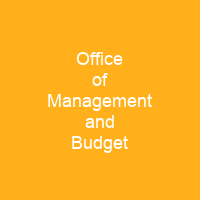The Office of Management and Budget is the largest office within the Executive Office of the President of the United States. Its most prominent function is to produce the president’s budget, but it also examines agency programs, policies, and procedures. The OMB director reports to the president, vice president and the White House chief of staff.
About Office of Management and Budget in brief

The Office of Information and Regulatory Affairs is the central clearing house for proposed legislation or testimony by federal officials. It is responsible for writing an Enrolled Bill that distills the comments about the proposed legislation to all relevant federal reviewers. The Legislative Reference Division is largely responsible for the technical estimation of the budget for the executive branch. The BRD serves a parallel to that of the Congressional Budget Office for estimating Congressional spending, and the Joint Committee on Taxation for estimating tax revenue. The office specializes in issues such as federal regulations and procurement policy and law. Other components are OMB-wide support offices, including the Office of General Counsel, the Budget Affairs Review Division and the Budget Reference Division.
You want to know more about Office of Management and Budget?
This page is based on the article Office of Management and Budget published in Wikipedia (as of Dec. 01, 2020) and was automatically summarized using artificial intelligence.







